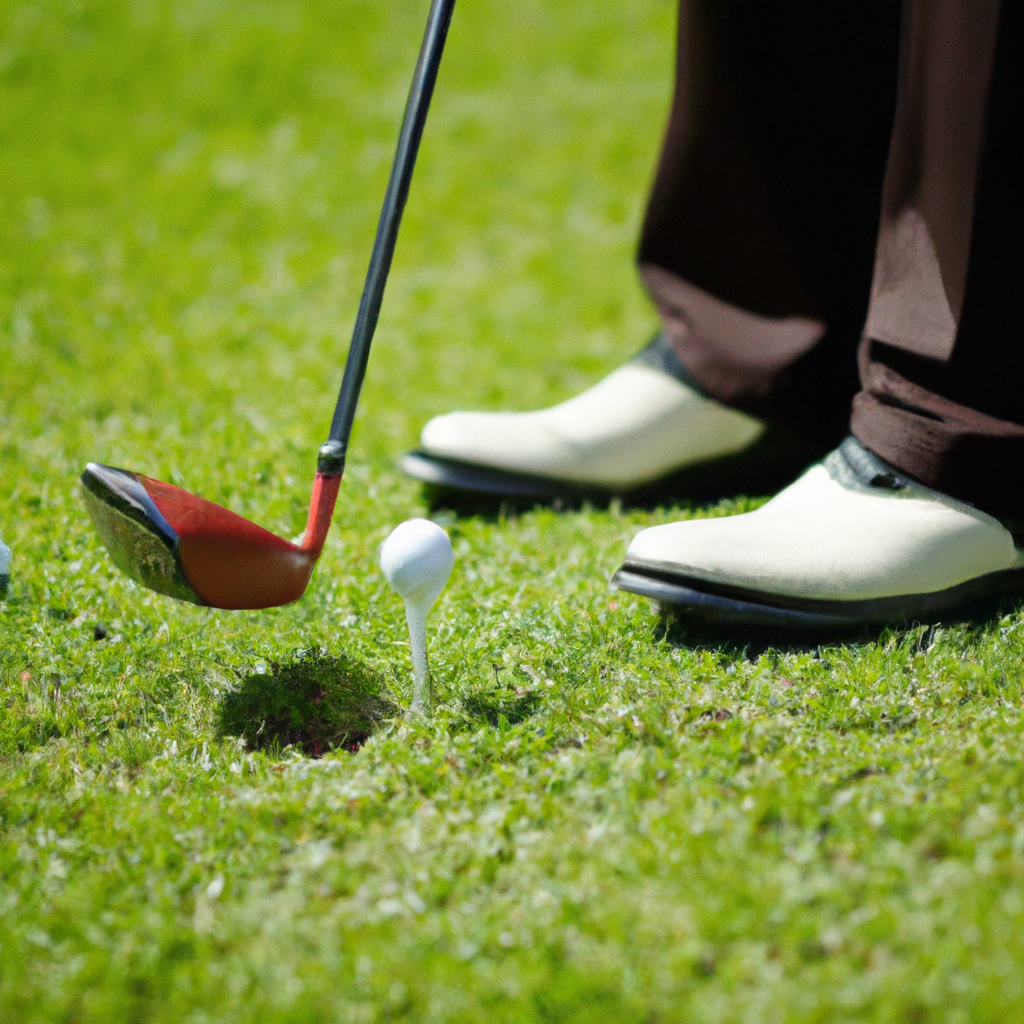We may earn money or products from the companies that may be mentioned in this post.
So, you’ve recently developed an interest in golf and now you’re wondering how long it takes to become a proficient player. Well, you’ve come to the right place! In this article, we’ll explore the timeline it generally takes for budding golfers to attain a level of skill that can be considered “good.” From the basics of grip and stance to mastering the art of the swing, we’ll provide some insights to help you estimate just how long it might take for you to excel on the golf course. Get ready to embark on an exciting journey filled with practice, perseverance, and a whole lot of fun!

Factors Affecting Improvement
Natural Talent
When it comes to golf, natural talent can certainly play a role in how quickly you improve. Some individuals may have an innate ability to pick up the game and excel at it, while others may have to put in more effort to achieve the same results. However, it’s important to remember that even if you don’t possess natural talent, with dedication and hard work, you can still become a proficient golfer.
Frequency of Practice
The more frequently you practice, the faster you are likely to see improvement in your golf skills. Consistently hitting the driving range or practicing your short game will help you develop muscle memory and improve your overall technique. Ideally, you should aim to practice multiple times a week to maximize your progress.
Quality of Instruction
Obtaining proper instruction is crucial in your golf journey. Working with a knowledgeable and experienced golf instructor can help you identify and correct any flaws in your technique, ultimately leading to improvement. They can guide you through drills, provide valuable feedback, and teach you advanced techniques that can take your game to the next level.
Physical Fitness
Physical fitness plays a significant role in your golf game. Having good stamina, flexibility, and strength can greatly enhance your swing mechanics and overall performance. Incorporating exercises that focus on improving your core strength, flexibility, and balance into your routine can benefit your golf game and prevent injuries.
Mental Game
Golf is as much a mental game as it is physical. Developing a strong mental game can significantly impact your performance on the course. Techniques such as visualization, maintaining a positive mindset, and practicing mindfulness can help you stay focused, manage pressure, and make better decisions during gameplay.
Experience and Skill Level
Experience and skill level also contribute to your improvement as a golfer. The more rounds of golf you play and the more varied situations you encounter on the course, the better equipped you become at handling different challenges. As you gain experience, your knowledge and decision-making skills will improve, leading to better performance and lower scores.
Equipment and Technology
While skill and technique are paramount in golf, having the right equipment can also make a difference. Using clubs that suit your swing characteristics and having access to technology like launch monitors or swing analyzers can help you identify areas of improvement and fine-tune your game. However, it’s important to note that the equipment alone cannot replace proper technique and practice.
Competitive Play
Engaging in competitive play can be a great motivator for improvement. Competing against others pushes you to challenge yourself, adapt to different playing conditions, and learn from your mistakes. Whether it’s participating in local tournaments, joining golf associations or leagues, or playing with friends in friendly matches, competitive play can help you gauge your progress and strive for continued improvement.
Consistency and Persistence
Consistency and persistence are key factors in improving your golf game. Progress may not come overnight, but by consistently practicing, seeking feedback, and persisting through challenges, you will gradually see improvement. It’s important to stay motivated, set realistic goals, and stay committed to the process.
Age and Learning Abilities
Age and learning abilities can influence how quickly you improve in golf. Younger individuals may have the advantage of being more flexible and picking up new skills more easily. However, golf is a sport that can be enjoyed and improved upon at any age. Even if you start later in life, with patience, dedication, and proper guidance, you can still achieve significant improvement and enjoy the game.
Assessing Skill Levels
Beginner
As a beginner, you are just starting your golf journey. You may have minimal experience or knowledge of the game, and your swing mechanics may still be a work in progress. At this stage, it’s important to focus on learning the basic rules, etiquette, and fundamentals of the game. Building consistency, establishing a solid foundation, and gaining familiarity with different clubs and equipment are key objectives for beginners.
Intermediate
Once you have moved past the beginner stage, you are considered an intermediate golfer. At this level, you have a good understanding of the game, possess a decent swing, and are familiar with the rules and various aspects of golf. Intermediate golfers often aim to refine their technique, improve their accuracy and distance, and start playing on different courses to gain a broader experience.
Advanced
Advanced golfers have developed a high level of skill and experience in the game. They have usually achieved consistency and a lower handicap, allowing them to compete at a higher level. Advanced golfers continue to refine their techniques, work on specialty shots, strategize and map out courses, and focus on the mental aspects of the game.

Timeline for Skill Development
Getting Started
When you are just getting started with golf, your main focus should be on acquiring the fundamental knowledge and skills. This stage may last anywhere from a few weeks to a couple of months, depending on how often you practice and how quickly you grasp the basics. During this time, it is essential to learn about golf etiquette, familiarize yourself with the essential rules, and develop an understanding of the various clubs and their purposes.
First Few Months
In the first few months of your golf journey, you will work on building consistency and developing your athletic ability. This stage involves regular practice to refine your swing mechanics, improve your timing and rhythm, and enhance your overall technique. Additionally, focusing on your short game, such as putting and chipping, can significantly impact your scores. Understanding course management and developing a basic knowledge of strategy is also important at this stage.
First Year
After a year of consistent practice and dedication, you should start seeing significant improvement in your golf game. Your swing mechanics will become more refined, resulting in increased accuracy and distance. You will have gained confidence on the course and may even consider joining local golf associations or leagues to further challenge yourself. Playing on different courses will expose you to varying playing conditions and help broaden your experience.
Two to Three Years
At the two to three-year mark, your golf game should be at an intermediate level. You will continue refining your techniques, focusing on specialty shots like draws and fades, and working on reducing your handicap. Tournament participation can provide valuable experience and help you assess your skills against other golfers. Strategizing and mapping out courses based on your strengths and weaknesses will become part of your pre-game routine.
Long-Term Development
Long-term development in golf involves ongoing refinement of techniques, enhancing your mental approach, and achieving consistency in your game. It is at this stage that you can work closely with an experienced coach or instructor to tailor your practice routines to your specific needs. Gaining experience in different playing conditions, such as windy or wet courses, will further improve your adaptability and overall performance.
Getting Started
Golf Basics
When getting started with golf, it’s important to familiarize yourself with the basics of the game. This includes understanding the objective of the game, knowing the proper grip, and learning the terminology associated with golf. Taking the time to educate yourself about the basics will provide a solid foundation for future improvement.
Swing Fundamentals
Understanding the fundamentals of the golf swing is crucial for success in the game. Learning how to position your body, maintain proper alignment, and execute a consistent swing will greatly impact your accuracy and distance. Working on your takeaway, downswing, and follow-through will help you develop a more efficient and effective swing.
Etiquette and Rules
Golf is a sport with a strong emphasis on etiquette and rules. Familiarizing yourself with golf etiquette, such as repairing divots and raking bunkers, is essential for a smooth and enjoyable experience on the course. Additionally, learning the basic rules of golf, such as penalty strokes and out-of-bounds, will help you play within the boundaries of the game.
Practice Facilities
Finding suitable practice facilities is vital for your skill development. Look for driving ranges that allow you to practice your long shots and provide practice areas for your short game. Practice facilities with putting greens, chipping areas, and even simulated bunkers will allow you to work on all aspects of your game.
Choosing Proper Equipment
Investing in the right equipment is important when starting out in golf. Consult with a professional or a knowledgeable golf retailer to ensure that you choose clubs that are appropriate for your skill level and swing characteristics. Having the right equipment will make learning and practicing easier and more enjoyable.

First Few Months
Developing Consistency
During the first few months of your golf journey, focus on developing consistency in your swings. This involves regular practice sessions to refine your technique and build muscle memory. Working on your tempo, rhythm, and timing will help you achieve more consistent and accurate shots.
Building Athletic Ability
Improving your athleticism can positively impact your golf game. Incorporate exercises that target your core strength, flexibility, and balance into your routine. This will help improve your stability during your swing and enhance your overall performance on the course.
Understanding Different Clubs
As a beginner, it’s important to familiarize yourself with different clubs and their purposes. Understanding the differences between irons, fairway woods, hybrids, and drivers will help you make more informed decisions when selecting clubs for various shots on the course.
Practicing Short Game
The short game, including putting, chipping, and pitching, is a critical aspect of golf. Devote time to practicing these elements during your first few months. Enhancing your ability to read greens, control your speed, and accurately gauge distances will significantly improve your overall scores.
Building Knowledge on Course Management
Developing a basic understanding of course management is crucial during the early stages of your golf journey. Learning how to assess risk-reward scenarios, strategize your shots, and navigate the course effectively will help you improve your scores and become a more well-rounded golfer.
First Year
Improving Swing Mechanics
In your first year of playing golf, focus on improving your swing mechanics. Work on reducing any flaws, such as a slice or hook, and develop a consistent and repeatable swing. Practice drills and seek feedback from an instructor to refine your technique and iron out any issues.
Enhancing Distance and Accuracy
As you progress in your golf journey, it’s natural to want to increase both distance and accuracy in your shots. During your first year, focus on building strength in your swing and improving your timing to generate more power. Simultaneously, work on your alignment, gripping, and posture to enhance accuracy and consistency.
Introduction to Playing on Different Courses
Explore different golf courses in your area to gain experience in playing on various terrains and under different conditions. Each course presents unique challenges, and by exposing yourself to different layouts, bunkers, and green speeds, you will develop adaptability and learn to adjust your game accordingly.
Building Confidence
Building confidence is crucial in golf. As you progress through your first year, focus on celebrating your successes and recognizing the improvements you’ve made. Developing a confident mindset will help you tackle challenges on the course and approach each shot with self-assurance.
Joining Golf Associations or Leagues
Consider joining local golf associations or leagues to further immerse yourself in the golf community and gain exposure to competitive play. These organizations often offer opportunities to participate in tournaments and meet fellow golfers who share your passion for the game.
Two to Three Years
Refining Techniques
At the two to three-year mark, your focus should be on refining your techniques. This involves fine-tuning your swing mechanics, further improving your short game, and developing consistency throughout your game. Working with a coach or instructor during this stage can be particularly beneficial in addressing any lingering issues and taking your game to the next level.
Mastering Specialty Shots
As an intermediate golfer, it’s important to expand your repertoire of shots. Mastering specialty shots, such as draws, fades, and low punches, can give you an advantage in navigating different course layouts and challenging conditions. Practice these shots during your practice sessions and seek guidance from an instructor to ensure proper execution.
Reducing Handicap
Working towards reducing your handicap is a common goal among golfers. Focus on improving your overall game, including your driving distance, accuracy, short game, and course management. Tracking your scores, identifying areas for improvement, and setting specific goals will help you work towards lowering your handicap.
Tournament Participation
Participating in tournaments is a great way to test your skills and gain experience in a competitive setting. Look for local tournaments or events that cater to golfers at your skill level. Tournament play will expose you to different course conditions, increase your confidence under pressure, and provide valuable feedback to further refine your game.
Strategizing and Course Mapping
As an experienced golfer, you should begin developing a strategic approach to each round. Analyze the layout of the course, identify your strengths and weaknesses, and create a game plan that maximizes your advantages. Course mapping can assist you in making informed decisions about club selection, shot shape, and positioning on the fairway to improve your overall performance.
Long-Term Development
Continued Technique Refinement
Even as an advanced golfer, there is always room for improvement in your technique. Continued refinement of your swing mechanics, short game, and specialty shots should remain a priority. Seek guidance from experienced instructors or coaches who can provide valuable feedback and help you fine-tune your skills.
Enhancing Mental Approach
Mental aspects of golf become increasingly crucial in long-term development. Focus on developing a strong mental approach to the game, including effective visualization techniques, mental rehearsal, and managing pressure situations. Improving your mental game will help you maintain focus, make better decisions, and handle the ups and downs of a round.
Developing Personalized Practice Routines
As your skills develop, it’s important to establish personalized practice routines that address your specific needs and goals. Identify areas that require further improvement and structure your practice sessions around those areas. This may include drills, simulated on-course play, or working on developing new skills or shot variations.
Gaining Experience in Different Playing Conditions
To become a well-rounded golfer, seek opportunities to play in different playing conditions. Windy days, wet courses, or varying temperatures present distinct challenges that require adjustments in shot selection, club choice, and overall strategy. Expanding your experience in different conditions will enhance your adaptability and overall game.
Achieving Consistency and Lower Handicaps
Long-term development in golf often focuses on achieving consistency and lowering handicaps. This requires a combination of refining technique, building mental resilience, and gaining experience on various courses. Continue tracking your scores, setting goals, and challenging yourself to consistently improve your game.
Expectations and Realities
Individual Differences
It’s important to recognize that everyone progresses at their own pace in golf. Individual differences, including natural talent, physical abilities, and dedication to practice, can greatly impact the speed of improvement. Comparing yourself to others may lead to frustration, so focus on your own journey and enjoy the process of improvement.
Plateaus
Plateaus are a normal part of skill development in any endeavor, including golf. There may be periods where it feels like your progress has stalled, and you’re not seeing significant improvements. During these times, it’s important to stay patient and persistent. Engaging in varied practice routines, seeking feedback, and working on mental aspects can help push through these plateaus.
Varied Goals
Each golfer has their own set of goals and objectives in the game. It may be reducing your handicap, competing in tournaments, or simply enjoying the game with friends and family. Recognize and embrace the goals that are important to you, and use them as motivation to continue improving.
Balancing Improvement with Enjoyment
While improvement is an important aspect of the golf journey, it’s equally important to find a balance between improvement and enjoyment. Remember why you started playing golf in the first place, and ensure that you continue to derive pleasure from the game. Golf is a lifelong pursuit, so savor the moments on the course and the friendships forged along the way.
Ongoing Learning and Adaptability
Golf is a constantly evolving game, and staying open to ongoing learning and adaptability is crucial. Seek out opportunities to learn from experienced players, stay updated on new techniques or equipment advancements, and remain flexible in your approach to the game. Embrace the fact that there is always room for growth and exploration in golf.
Conclusion
Improving your golf game is a journey that requires dedication, patience, and a commitment to ongoing practice. Factors such as natural talent, frequency of practice, quality of instruction, physical fitness, mental game, experience, and equipment can all contribute to the speed and depth of your improvement. Assessing your skill level and setting realistic goals at different stages of your golf journey will help guide your focus and measure progress. Whether you are a beginner, intermediate, or advanced golfer, the key is to enjoy the process, maintain a positive mindset, and never stop striving for improvement. Golf is a lifelong pursuit that offers endless opportunities for growth and enjoyment, and each step forward on your golf journey is a reason to celebrate. So, grab your clubs, hit the fairways, and embark on an exciting adventure towards becoming the best golfer you can be!
